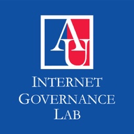By Kenneth Merrill
As a massive cyberattack spread across the globe on Tuesday, cybersecurity experts gathered in Tel Aviv for Cyber Week 2017, an annual conference bringing together scholars, industry leaders, and government officials to share methods and knowledge on a range of topics relevant to cybersecurity.
Among the experts in attendance was American University School of Communication Professor and Internet Governance Lab Co-director Dr. Laura DeNardis, who delivered a presentation titled “Privacy Complications in Cyber Physical Systems,” examining the privacy and security implications of the “Internet of Things.”
Also at the conference was Washington College of Law Professor and Internet Governance Lab Faculty Fellow Jennifer Daskal, who presented her work “Data and Territory: A Round Peg in a Square Hole,” addressing conflicts of law occurring at the intersection of the Internet and jurisdiction.
Both presentations, and indeed the entire conference, could not have been more timely.
On Tuesday ransomware attacks spread from Ukraine across the globe, crippling thousands of systems, including a major shipping company, at least one airport, ATM machines, and supermarket cash registers. Coming on the heels of a similar attack in May using the WannaCry ransomware, Tuesday’s Petya ransomware attack also used Eternal Blue, one of several hacking tools stolen from the National Security Administration and leaked by a group called the Shadow Brokers. And while it is still unclear who may be behind this latest attack (the fact that neither ransomware attacks collected much in the way of ransoms is leading some to suggest proxies working on behalf of nation-states), Professor DeNardis’s presentation underscored the extent to which the Internet of things introduces countless new vectors through which malicious code can spread.
Meanwhile, Professor Daskal’s discussion focusing on the incongruities of territorial sovereignty in cyberspace proved especially salient on Wednesday as Canada’s Supreme Court ruled that it could force Google to remove search results worldwide. Also on Wednesday, Pavel Durov, founder of the controversial messaging app Telegram, agreed to comply with a Russian law that requires information technology companies operating in the country to store data locally, as well as agreeing to hand over information to Russian authorities on request.
Cyber Week 2017 runs through Thursday, June 28th. You can follow along at #CyberWeek.
